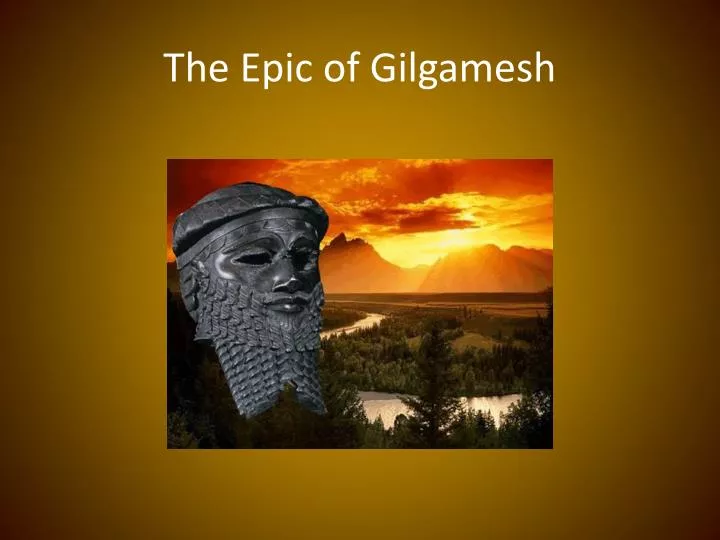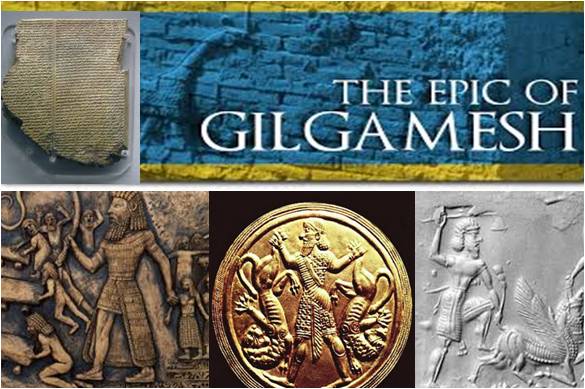

When he will not be dissuaded, she gives him directions to Urshanabi, the ferryman. He speaks with the goddess Siduri at her tavern, and she attempts to dissuade him from his quest for immortality, saying that immortality would leave humankind unable to appreciate any pleasures of the world. After travelling in darkness through the path, he arrives at a beautiful garden by the sea. Two scorpion monsters allow Gilgamesh to pass through the path to Utnapishtim after learning of his divine ancestry. He attempts to find Utnapishtim, the Mesopotamian Noah who survived the Great Flood by building a great ark and taking his family and livestock aboard.

Gilgamesh, mad with grief and now terrified of his own mortality, dons animal skins and sets off into the wilderness. Enkidu eventually dies, upset that he was not granted a magnificent death in battle. He wanders out of the city, weakens gradually, dreaming of the Angel of Death dragging him to the afterlife, a world where souls crawl on their bellies and eat dust. However, the Bull of Heaven is also slain by Gilgamesh and Enkidu, enraging the goddess further.īecause the two have killed Humbaba and the Bull of Heaven in defiance of the gods, the gods decide one of them must die, and Enkidu is marked for death. He refuses, but she threatens to raise the dead and have them overrun the world of the living, so he relents. She asks her father to release the Bull of Heaven on the lands as punishment. Gilgamesh attracts the attention of Ishtar, the goddess of fertility, but he rejects her, as her lovers often meet ill fates. The two cut down the forbidden cedar trees Humbaba had been guarding, setting aside one to be used as the door to a new temple, and the rest are made into a raft the two use to return home. Gilgamesh hesitates, but Enkidu angrily urges him to finish off the demi-god, which Gilgamesh does. When he is nearly slain, Humbaba begs for his life. Enkidu interprets these as good omens, and the two fight Humbaba, aided by Shamash, the sun god. Gilgamesh has five dreams of the mountain falling, storms, and other calamities. The pair travels to the Cedar Forest and perform a dream ritual. Ninsun seeks the protection of the sun god for her sons and is left instructions on governing the city for the duration of their travels. Gilgamesh's mother, the goddess Ninsun, offers her blessing for the adventure, and adopts Enkidu as her child, making he and Gilgamesh brothers. Though the elders and Enkidu disagree with this idea, Gilgamesh cannot be persuaded. Gilgamesh proposes that the two travel to the Cedar Forest to slay the demi-god Humbaba. However, upon realizing each other's strength, they decide instead to be friends. Furious, he leaves for Uruk, and when Gilgamesh tries to enter the wedding chamber he is blocked by Enkidu, and the two fight. Gilgamesh, meanwhile, has been dreaming about meeting a new companion.Įnkidu has been working as a shepard, protecting the livestock of a small village, when he hears of how Gilgamesh rapes women on their wedding day. She suggests that he join with civilization. Enkidu has sex with her for seven days straight, after which time the animals will no longer approach him, because he is no longer one of them.

The hunter sends Shamhat, a temple prostitute, to seduce Enkidu, as he believes this will tame him. This wild man, who lives with wild animals and is named Enkidu, attracts attention when he uproots traps belonging to a local hunter. The gods answer their prayers by creating out of clay a man in equal strength to Gilgamesh. His people cry out to the gods for protection, as Gilgamesh has a habit of taking whatever woman he wants, married or not, and forcing the men of his city into battles or construction on grand buildings. Gilgamesh, King of Uruk, is two-thirds god and one-third man, and mortal. The story deals with a fictionalized version of King Gilgamesh, his friendship with Enkidu, and his failed quest for immortality following the death of Enkidu. The story has been recovered mainly from twelve stone tablets fragments from several other versions found have added some missing details to create a more comprehensive story, although even today some parts of it are missing. The epic is derived from several earlier poems written about Gilgamesh, which serve as a background for the events in the Epic of Gilgamesh. It is loosely based on the life of the real king of Uruk (modern day Iraq). The Epic of Gilgamesh is an epic narrative poem written in ancient Mesopotamia. One of the stone tablets on which The Epic of Gilgamesh was written.


 0 kommentar(er)
0 kommentar(er)
